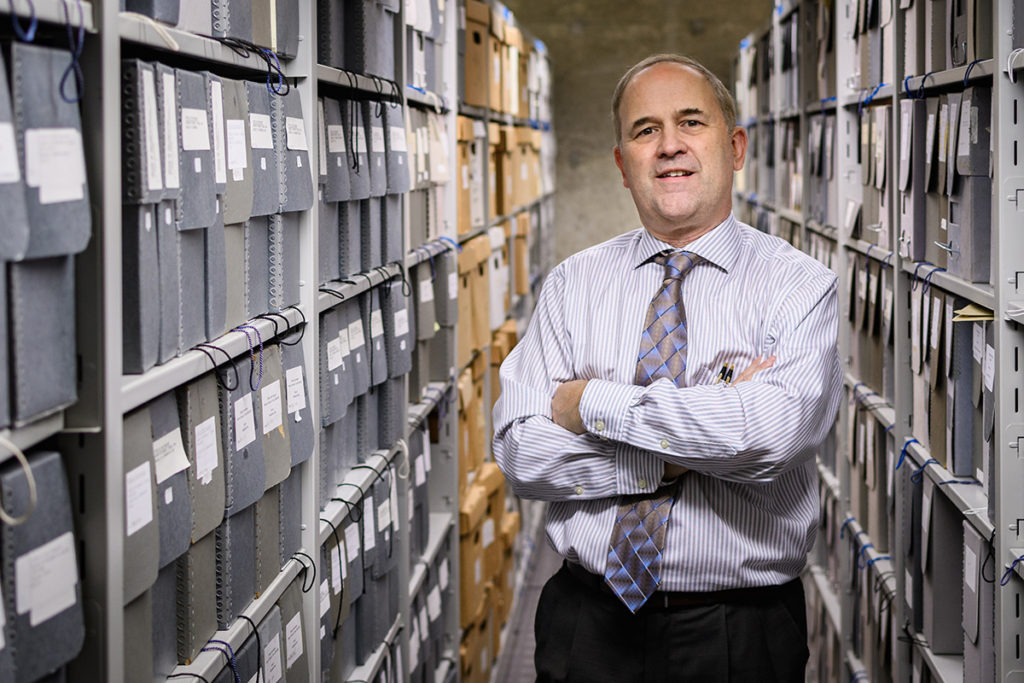Mott Linn’s honor is one for the books

Ask anyone why they became an archivist, and chances are good the answer will include some combination of a love of history and a weakness for books.
Mott Linn certainly shares those passions. But how he found his way into the profession can be summed up in a single word not found on many archivists’ résumés: hockey.
Linn had played club hockey at the University of Delaware and was planning a career as a history professor when the Philadelphia Flyers came calling in 1985. The NHL team needed someone to help document and preserve their history, and Linn brought the necessary combination of skills.
“The Flyers’ archivist was looking for someone to train. There were plenty of applicants who knew hockey, and plenty who knew archival work, but I was the only one who could really handle both,” he recalls.
Linn would transform a job into a career, leading him to Clark University, where he has worked for 20 years — 10 of them as archivist before being promoted to head of collections.
His work in the field and commitment to the profession have not gone unnoticed. In August, the Academy of Certified Archivists presented Linn with the Distinguished Service Award at its annual meeting in Washington, D.C. The award recognizes Linn’s leadership and his efforts to improve the organization’s fiscal planning and increase its outreach.
“The profession has radically changed in the last 30 to 40 years,” he says. “There were very few programs offering archival courses, and job training was really through a mentor-apprentice relationship. Now you need to take at least three archives classes, and many get certified and then recertified every five years.”
Linn himself holds five degrees in history, public administration, and library science, including a doctorate in library administration from Simmons College. He credits his Clark master’s degree in public administration with helping him develop the skills needed to lead the ACA.
Significant change within the Academy of Certified Archivists has come about thanks to Linn’s vision. As the organization’s treasurer from 2008 to 2012, he instituted budgetary changes, and in 2014 he began a three-year stint as president, during which the Academy generated a record number of applications for the certification exam.
Linn arrived at Clark University in 1998. “The Goddard Library got a renovation after I started, and we expected that to bring in some 30 to 50 percent more students,” he recalls. “In fact, we doubled our walk-in rate, and we’ve never really dipped.” While it may sound surprising that in an age of mobile devices a library would see increased foot traffic, Linn insists students use the resources “more than they ever have.”
The growth in library use has coincided with Linn’s own professional development. After 10 years as Clark’s archivist, he assumed the role of head of collections, where his efforts include working with faculty to acquire books and academic journals, prepare resources for the patrons, and procure research tools. One of his biggest projects is organizing and overseeing the Friends of the Goddard Library’s Annual Book Sale each fall, a multiday event that brings in hundreds of people looking to purchase everything from Tom Clancy thrillers to chemistry textbooks.
In 2016, Linn delivered the keynote talk at a conference of NASA historians about Dr. Robert Goddard, the Clark physicist whose experiments earned him the title “The Father of Modern Rocketry.”
Linn has seen significant changes in archiving over the years. Digital tools in particular have made the archivist’s job easier, with more information becoming accessible worldwide. Linn notes that archivists have traveled from as far away as Australia and Japan to do research at Clark.
An influx of trained archivists is a positive sign, he says. “It’s good to see that more and more people are becoming certified and thereby strengthening the profession.”


